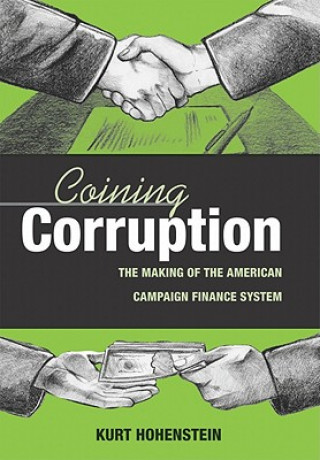
Code: 04750173
Coining Corruption
by Kurt Hohenstein
In the wake of Watergate, Congress passed the Federal Election Campaign Act (FECA) in an effort to prevent the corruption of future elections. The U.S. Supreme Court, in Buckley v. Valeo (1976), defined corruption as quid pro quo ... more
- Language:
 English
English - Binding: Hardback
- Number of pages: 320
Publisher: Cornell University Press, 2007
- More about this

67.78 €

Low in stock at our supplier
Shipping in 12 - 17 days
Potřebujete více kusů?Máte-li zájem o více kusů, prověřte, prosím, nejprve dostupnost titulu na naši zákaznické podpoře.
Add to wishlist
You might also like
-

How to Be a Good Husband
6.34 € -15 % -

Social in the Global
165.38 € -

Dictionary of Medieval Latin from British Sources: Fascicule III: D-E
85.09 € -

Technology and Scholarly Communication
49.76 € -

Critical Turns in Critical Theory
241.67 €
Give this book as a present today
- Order book and choose Gift Order.
- We will send you book gift voucher at once. You can give it out to anyone.
- Book will be send to donee, nothing more to care about.
More about Coining Corruption
You get 167 loyalty points
 Book synopsis
Book synopsis
In the wake of Watergate, Congress passed the Federal Election Campaign Act (FECA) in an effort to prevent the corruption of future elections. The U.S. Supreme Court, in Buckley v. Valeo (1976), defined corruption as quid pro quo - "get for giving" - meaning Congress could only regulate the kind of corruption that had occurred if a campaign contributor received political favors from the candidate. This definition has since shaped and limited efforts at campaign finance reform, often with ironic and unintended consequences. By shifting the focus to the source and amount of contributions, however, the justices in the Buckley decision ignored disparities in funding and the resulting ability of particular candidates to dominate communication channels.In "Coining Corruption", legal and political historian Kurt Hohenstein provides a hitherto untold story about the successes and limitations of political reform. From 1876 until 1976, lawmakers and courts permitted regulation that potentially infringed upon freedom of speech: they understood corruption as the conversion of economic power into political power. In their view, corruption existed if a candidate's unfettered campaign spending overwhelmed other voices and limited real deliberation. Yet, as Hohenstein shows, Buckley's limited quid pro quo definition ignores these considerations.Following the evolution of the campaign finance system through the Bipartisan Campaign Reform Act of 2001 and the Supreme Court's decisions in McConnell v. FEC (2001) and Landell v. Sorrell (2006), Hohenstein calls for a return to a broad, historical understanding of corruption. American democracy demands regulation of the sources and amounts of campaign funding in order to prevent a monopoly on the vehicles of political debate. Those interested in reform politics, public policy, constitutional history, and Congress will appreciate this ground-breaking study.
 Book details
Book details
Book category Knihy po anglicky Humanities History Regional & national history
67.78 €
- Full title: Coining Corruption
- Author: Kurt Hohenstein
- Language:
 English
English - Binding: Hardback
- Number of pages: 320
- EAN: 9780875803777
- ID: 04750173
- Publisher: Cornell University Press
- Weight: 28 g
- Dimensions: 229 × 152 × 22 mm
- Date of publishing: 15. August 2007
Trending among others
-

Hundred Years' War on Palestine
12.07 € -24 % -

Ethnic Cleansing of Palestine
14.43 € -23 % -

History of Japan
16.38 € -19 % -

Ten Myths About Israel
13.61 € -14 % -

Strange Death of Europe
16.58 € -23 % -

Decline and Fall of the Roman Empire
5.93 € -21 % -

Secret History
13.81 € -21 % -

God's Playground A History of Poland
68.81 € -

Mayflower
15.76 € -23 % -

How to be a Victorian
14.43 € -23 % -

Plantagenets
13.20 € -29 % -

General's Son
20.27 € -4 % -

Iran: A Very Short Introduction
9 € -31 % -

Temples of Karnak
153.81 € -

Twenty Years A-Growing
10.13 € -22 % -

Cuneiform
11.15 € -23 % -

History of Witchcraft in England from 1558 to 1718
19.04 € -

China in Africa
37.47 € -

Islandman
10.13 € -22 % -

Bohemian Paris
16.58 € -18 % -

Alexiad
17.81 € -20 % -

Lancaster And York
22.93 € -

Inside Hitler's Greece
20.78 € -14 % -

Modern France: A Very Short Introduction
9.41 € -34 % -

Diana: Her True Story - In Her Own Words
11.05 € -23 % -

The Fourth Turning
19.55 € -6 % -

The Oxford History of Ancient Egypt
15.45 € -23 % -

Churchill: The Power of Words
15.15 € -22 % -

Palestine
20.27 € -20 % -

Korean History in Maps
28.05 € -10 % -

Great Gatsby (Wisehouse Classics Edition)
16.17 € -37 % -

Viking Way
46.28 € -7 % -

The Thirteenth Tribe
12.59 € -

My Promised Land
20.88 € -23 % -

Vanished Kingdoms
18.83 € -22 % -

Age Of Revolution
16.58 € -23 % -

Life and Death of Anne Boleyn
23.03 € -

Coming of the Third Reich
18.73 € -23 % -

Children of Ash and Elm
18.42 € -15 % -

Europe Between the Oceans
34.19 € -7 % -

Socialism Betrayed
19.55 € -19 % -

303 Squadron
19.45 € -17 % -

Ancient Celts, Second Edition
26.82 € -19 % -

Dancing in the Glory of Monsters
15.76 € -23 % -

Battle of Britain: Luftwaffe Blitz (Images of War)
25.90 € -1 % -

Age of Confucian Rule
36.04 € -

Beyond Band of Brothers
16.58 € -23 % -

Benjamin Franklin
18.73 € -13 % -

On China
17.19 € -21 %
Osobný odber Bratislava a 2642 dalších
Copyright ©2008-24 najlacnejsie-knihy.sk Všetky práva vyhradenéSúkromieCookies


 21 miliónov titulov
21 miliónov titulov Vrátenie do mesiaca
Vrátenie do mesiaca 02/210 210 99 (8-15.30h)
02/210 210 99 (8-15.30h)